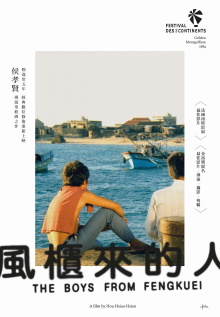
This probably marks the last of the old films by Hou Hsiao-hsien that we’re likely to watch as the rest are not as significant but it actually predates the rest and was the first in which he establishes the style that he would be known for. In a way it also acts as a compressed version of his later Coming of Age trilogy as it contains nearly all of the same basic ingredients. Critics liked this for its authenticity and groundbreaking rawness at the time but I think I like the later, more refined films much more.
Ah Ching and his two friends are school dropouts and delinquents who live on the remote island fishing village of Fengkuei. They frequently get into fights with other gangs of boys and are eventually caught by the police. The three of them then decide to go to the port city of Kaohsiung to look for work as one of them has an elder sister already living there. She arranges for them to stay at an apartment complex where another man from Fengkuei lives and he in turn helps them get factory jobs. The older man lives together with his girlfriend Hsiao-hsing and Ah Ching feels attracted to her. As he adapts to life in the city, he also seems to grow up in terms of temperament and becomes more responsible as he starts to think more about what sort of future he wants for himself.
As I noted, once you’ve watched the complete trilogy, you’d recognize plenty of familiar elements. Some such as the boys being brats are a given and probably reflect the director’s own childhood experiences. But it’s interesting to note the frequent absence of a father figure as part of growing up, here represented by a father who has become mentally incapacitated due to an accident. One recurring motif that Hou employs here seems unique to this film: the sight of women’s underwear being hung up to dry. I take it that is used as a shorthand to represent the boys’ awkwardness and inexperience when it comes to sexual attraction. It’s also notable that the usual image associated with this film is that of the boys living carefree lives on the island but that represents only a relatively small portion as the boys move to the city soon enough and Ah Ching seems to grow apart from the other two. This film is mainly about him coming of age in the city.
On the whole, this is of course excellent work but I much prefer the more refined and more tightly focused films of the trilogy. The rawness of this film is real and feels authentic but parts of it also come across as awkward stumbling, such as Ah Ching’s flashback scenes of his father before his accident, which don’t fit in with what he is doing in the city. Here Hou seems to be trying to portray a general sense of what Ah Ching’s life at that age is like is like but there are too many disparate threads here to make this especially engrossing. There are good ideas all around, the sense of dislocation with the country boys moving to the city, Ah Ching’s unresolved love for his father, his feelings for Hsiao-hsing, how he seems to be moving in a different direction from his childhood friends. But as he has time to only briefly touch on each subject, the whole experience is too shallow to be satisfying.
I’d still recommend watching this if you’re a fan of Hou’s work and have watched just about everything else. It’s actually is cool as well how Ah Ching being from a fishing village is thematically different from his other characters who hail from different places. Finally, I also note that Fengkuei is such an obscure place that it’s almost impossible to find any information about it online. By now, what the place is most famous for is this film itself and as I understand it that region of Taiwan is now mainly reliant on tourism.